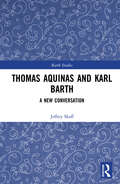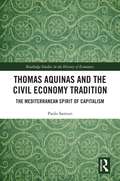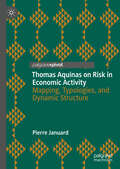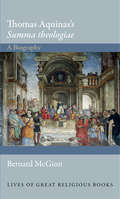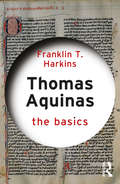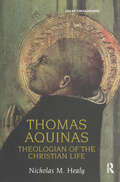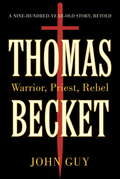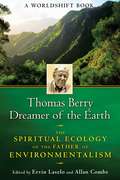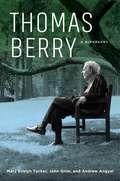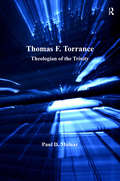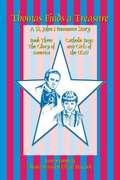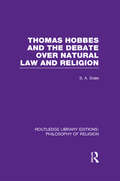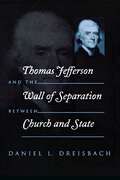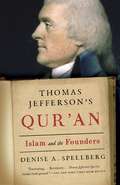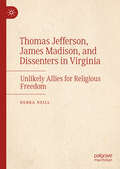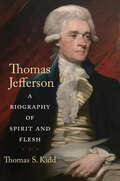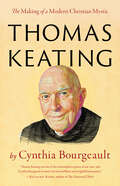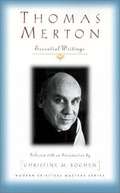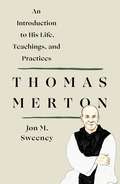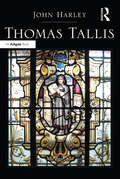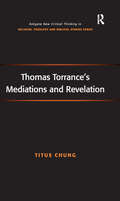- Table View
- List View
Thomas Aquinas and Karl Barth: A New Conversation (Barth Studies)
by Jeffrey SkaffThis book argues for substantial and pervasive convergence between Thomas Aquinas and Karl Barth with regards to God’s relation to history and to the Christocentric orientation of that history. In short, it contends that Thomas can affirm what Barth calls "the humanity of God." The argument has great ecumenical potential, finding fundamental agreement between two of the most important figures in the Reformed and Roman Catholic traditions. It also contributes to contemporary theology by demonstrating the fruitfulness of exchanging metaphysical vocabularies for normative. Specifically, it shows how an account of God’s mercy and justice can resolve theological debates most assume require metaphysical speculation.
Thomas Aquinas and the Civil Economy Tradition: The Mediterranean Spirit of Capitalism (Routledge Studies in the History of Economics)
by Paolo SantoriDelving into the history of economic thought, this book presents a picture of the Mediterranean spirit of capitalism, a tradition that has its protagonists in Thomas Aquinas and the eighteenth-century civil economy, and seeks to understand its presence and relevance for contemporary societies. The book argues that it is reductive to attribute to the ‘Protestant ethic’ the different formations of capitalism in the Western world. Instead, it is vital to acknowledge the differences in the ways in which the market is lived, enterprises are created and conducted, and civic life in general is understood in different regions. This thought-provoking study demonstrates that in Southern Europe, the legacy of Aquinas and the civil economy adds different terms to those recurring in classical and neo-classical economy: common good, reciprocity, virtue, public trust, mutual assistance, and public happiness. It is these ideas of a market as a place for mutual assistance which can be said to characterize the Mediterranean spirit of capitalism. Thomas Aquinas and the Civil Economy Tradition will be of interest to advanced students and researchers in the history of economic thought, economic philosophy, Christian ethics, and moral theology.
Thomas Aquinas on Moral Wrongdoing
by Colleen MccluskeyMedieval thinkers were both puzzled and fascinated by the capacity of human beings to do what is morally wrong. In this book, Colleen McCluskey offers the first comprehensive examination of Thomas Aquinas' explanation for moral wrongdoing. Her discussion takes in Aquinas' theory of human nature and action, and his explanation of wrong action in terms of defects in human capacities including the intellect, the will, and the passions of the sensory appetite. She also looks at the notion of privation, which underlies Aquinas' account of wrongdoing, as well as his theory of the vices, which intersects with his basic account. The result is a thorough exploration of Aquinas' psychology which is both accessible and illuminating, and will be of interest to a wide range of readers in Aquinas studies, medieval philosophy, the history of theology, and the history of ideas.
Thomas Aquinas on Risk in Economic Activity: Mapping, Typologies, and Dynamic Structure
by Pierre JanuardThis book provides a detailed look at Thomas Aquinas’s view and understanding of economic activity. The work of Aquinas, one of the greatest thinkers of the Middle Ages, is contextualised within his own experiences, the history of the era, and the socio-economic changes underway in 13th-century Europe. Particular attention is paid to Aquinas’s approach to risk, mapping out the different forms of risk he addresses, establishing typologies, and presenting it as a dynamic structure. This book offers unique insight into the economic work of Thomas Aquinas. It will be relevant to students and researchers interested in the history of economic thought, economic analysis of risk, medieval studies, philosophy, and theology.
Thomas Aquinas on War and Peace
by Gregory M. ReichbergInquiring 'whether any war can be just', Thomas Aquinas famously responded that this may hold true, provided the war is conducted by a legitimate authority, for a just cause, and with an upright intention. Virtually all accounts of just war, from the Middle Ages to the current day, make reference to this threefold formula. But due in large measure to its very succinctness, Aquinas's theory has prompted contrasting interpretations. This book sets the record straight by surveying the wide range of texts in his literary corpus that have bearing on peace and the ethics of war. Thereby emerges a coherent and nuanced picture of just war as set within his systematic moral theory. It is shown how Aquinas deftly combined elements from earlier authors, and how his teaching has fruitfully propelled inquiry on this important topic by his fellow scholastics, later legal theorists such as Grotius, and contemporary philosophers of just war.
Thomas Aquinas's Summa theologiae: A Biography (Lives of Great Religious Books #41)
by Bernard McGinnThe life and times of the most important theological work of medieval ChristendomThis concise book tells the story of the most important theological work of the Middle Ages, the vast Summa theologiae of Thomas Aquinas, which holds a unique place in Western religion and philosophy. Written between 1266 and 1273, the Summa was conceived by Aquinas as an instructional guide for teachers and novices and a compendium of all the approved teachings of the Catholic Church. It synthesizes an astonishing range of scholarship, covering hundreds of topics and containing more than a million and a half words—and was still unfinished at the time of Aquinas's death.Here, Bernard McGinn, one of today’s most acclaimed scholars of medieval Christianity, vividly describes the world that shaped Aquinas, then turns to the Dominican friar’s life and career, examining Aquinas’s reasons for writing his masterpiece, its subject matter, and the novel way he organized it. McGinn gives readers a brief tour of the Summa itself, and then discusses its reception over the past seven hundred years. He looks at the influence of the Summa on such giants of medieval Christendom as Meister Eckhart, its ridicule during the Enlightenment, the rise and fall of Neothomism in the nineteenth and twentieth centuries, the role of the Summa in the post–Vatican II church, and the book’s enduring relevance today.Tracing the remarkable life of this iconic work, McGinn’s wide-ranging account provides insight into Aquinas’s own understanding of the Summa as a communication of the theological wisdom that has been given to humanity in revelation.
Thomas Aquinas: The Basics (The Basics)
by Franklin T. HarkinsThomas Aquinas: The Basics is an engaging introduction to the theology of arguably the greatest theologian and philosopher of the Middle Ages. The sophistication and complexity of his thought can be daunting for those approaching his work for the first time. Through this lively and accessible book, Harkins provides an entry point to understanding Aquinas’s mature theological thought. As well as giving an overview of Aquinas’s life and written works, this book examines Aquinas’s understanding of: • the nature and purpose of theology; • God’s nature, existence, and operations; • the Trinity; • creation; • evil; • the human person, human happiness, and the virtues; • Christ and salvation; and • the sacraments. Including a useful glossary of key terms, this text is ideal for students and interested non-specialists seeking an understanding of the theology of Aquinas.
Thomas Aquinas: Theologian of the Christian Life (Great Theologians Series)
by Nicholas M HealyThe work of Thomas Aquinas (1224-1275) has become increasingly influential in recent doctrinal theology and theological ethics, aside from his extraordinary historical significance. Thomas has been read ever since his death, today as much as ever. What is it that distinguishes his work, and can his theological judgments and proposals still be brought to bear in contemporary theological inquiry? This book presents a new study of Thomas Aquinas, focusing on the evangelical, pastoral and theocentric character of his premodern theology. Healy presents Thomas as first and foremost a theologian of the Christian life, who when he used philosophical concepts did so in order to fulfill the task of theology, which he conceived as an ecclesial discipline dedicated above all to helping Christians follow Jesus Christ. Thomas's interpretation of Scripture and his theological method, his Trinitarian ontology, his Christology and his Christological anthropology, conception of the church and sacramental theology, are all examined from this perspective. The richness and complexity yet profound simplicity of the Christian way of life Thomas reveals is shown to make a valuable contribution to the thought of contemporary readers, and the significance of Thomas's writings for contemporary theological questions and concerns is revealed.
Thomas Becket
by John GuyA revisionist new biography reintroducing readers to one of the most subversive figures in English history--the man who sought to reform a nation, dared to defy his king, and laid down his life to defend his sacred honor NEW YORK TIMES BESTSELLER * NAMED ONE OF THE BEST BOOKS OF THE YEAR BY KANSAS CITY STAR AND BLOOMBERGBecket's life story has been often told but never so incisively reexamined and vividly rendered as it is in John Guy's hands. The son of middle-class Norman parents, Becket rose against all odds to become the second most powerful man in England. As King Henry II's chancellor, Becket charmed potentates and popes, tamed overmighty barons, and even personally led knights into battle. After his royal patron elevated him to archbishop of Canterbury in 1162, however, Becket clashed with the King. Forced to choose between fealty to the crown and the values of his faith, he repeatedly challenged Henry's authority to bring the church to heel. Drawing on the full panoply of medieval sources, Guy sheds new light on the relationship between the two men, separates truth from centuries of mythmaking, and casts doubt on the long-held assumption that the headstrong rivals were once close friends. He also provides the fullest accounting yet for Becket's seemingly radical transformation from worldly bureaucrat to devout man of God. Here is a Becket seldom glimpsed in any previous biography, a man of many facets and faces: the skilled warrior as comfortable unhorsing an opponent in single combat as he was negotiating terms of surrender; the canny diplomat "with the appetite of a wolf" who unexpectedly became the spiritual paragon of the English church; and the ascetic rebel who waged a high-stakes contest of wills with one of the most volcanic monarchs of the Middle Ages. Driven into exile, derided by his enemies as an ungrateful upstart, Becket returned to Canterbury in the unlikeliest guise of all: as an avenging angel of God, wielding his power of excommunication like a sword. It is this last apparition, the one for which history remembers him best, that will lead to his martyrdom at the hands of the king's minions--a grisly episode that Guy recounts in chilling and dramatic detail. An uncommonly intimate portrait of one of the medieval world's most magnetic figures, Thomas Becket breathes new life into its subject--cementing for all time his place as an enduring icon of resistance to the abuse of power.From the Hardcover edition.
Thomas Berry, Dreamer of the Earth: The Spiritual Ecology of the Father of Environmentalism
by Ervin Laszlo Allan CombsA tribute to the visionary contributions and prophetic writings of Thomas Berry, spiritual ecologist and father of environmentalism • Contains 10 essays by eminent philosophers, thinkers, and scientists in the field of ecology and sustainability, including Matthew Fox, Joanna Macy, Duane Elgin, Sean Esbjörn-Hargens, Ervin Laszlo, and Allan Combs • Calls for a transformation of consciousness to resolve today’s global ecological and human challenges • Includes a little-known but essential essay by Thomas Berry When cultural historian and spiritual ecologist Thomas Berry, described by Newsweek magazine as “the most provocative figure among the new breed of eco-theologians,” passed away in 2009 at age 94, he left behind a dream of healing the “Earth community.” In his numerous lectures, books, and essays, Berry proclaimed himself a scholar of the earth, a “geologian,” and diligently advocated for a return to Earth-based spirituality. This anthology presents 10 essays from leading philosophers, scientists, and spiritual visionaries--including Matthew Fox, Joanna Macy, Duane Elgin, Sean Esbjörn-Hargens, Ervin Laszlo, and Allan Combs--on the genius of Berry’s work and his quest to resolve our global ecological and spiritual challenges, as well as a little-known but essential essay by Berry himself. Revealing Berry’s insights as far ahead of their time, these essays reiterate the radical nature of his ideas and the urgency of his most important conclusion: that money and technology cannot solve our problems, rather, we must reestablish the indigenous connection with universal consciousness and return to our fundamental spontaneous nature--still evident in our dreams--in order to navigate our ecological challenges successfully.
Thomas Berry: A Biography (G - Reference, Information And Interdisciplinary Subjects)
by Mary Evelyn Tucker John Grim Andrew AngyalThomas Berry (1914–2009) was one of the twentieth century’s most prescient and profound thinkers. As a cultural historian, he sought a broader perspective on humanity’s relationship to the earth in order to respond to the ecological and social challenges of our times. This first biography of Berry illuminates his remarkable vision and its continuing relevance for achieving transformative social change and environmental renewal.Berry began his studies in Western history and religions and then expanded to include Asian and indigenous religions, which he taught at Fordham University, Barnard College, and Columbia University. Drawing on his explorations of history, he came to see the evolutionary process as a story that could help restore the continuity of humans with the natural world. Berry urged humans to recognize their place on a planet with complex ecosystems in a vast, evolving universe. He sought to replace the modern alienation from nature with a sense of intimacy and responsibility. Berry called for new forms of ecological education, law, and spirituality, as well as the creation of resilient agricultural systems, bioregions, and ecocities. At a time of growing environmental crisis, this biography shows the ongoing significance of Berry’s conception of human interdependence with the earth as part of the unfolding journey of the universe.
Thomas F. Torrance: Theologian of the Trinity (Great Theologians Series)
by Paul D. MolnarThis book provides an important study of the theology of Thomas F. Torrance, who is generally considered to have been one of the most significant theologians writing in English during the twentieth century, with a view toward showing how his theological method and all his major doctrinal views were shaped by his understanding of the doctrine of the Trinity. Torrance pursued a theology that was realist because he attempted to think in accordance with the unique nature of the object that is known. In holding to such a methodology, he drew an analogy between theology and natural science. This book demonstrates how, for Torrance, God relates with humanity within time and space so that creation finds its meaning in relation to God and not in itself; this enabled him to avoid many theological pitfalls such as agnosticism, subjectivism and dualism while explaining the positive implications of various Christian doctrines in a penetrating and compelling manner. This book offers an important resource for students of theology and for scholars who are interested in seeing how serious dogmatic theology shapes and should shape our understanding of the Christian life.
Thomas Finds a Treasure: A St. John Neumann Story
by Joan StrombergThomas Hrodej's father, a tough Bohemian immigrant, helped build the Erie Canal. When Thomas is picked on by the town bullies, will he be as tough as his father? When they use the ultimate weapon...rumors and gossip, Thomas turns to the new, young Bohemian priest, Fr. Neumann, for help. What he finds is a treasure! It's 1836 Williamsville, New York, and the Erie Canal is opening the West. Catholics are persecuted, misunderstood, and, at times, even despised. Follow the Adventures of Thomas and Father John Neumann as they encounter bandits, thugs with guns, creatures in the forest, and the special gifts of their own faith, friends, and family. Unit study on the Erie Canal included.
Thomas Hobbes and the Debate over Natural Law and Religion (Routledge Library Editions: Philosophy of Religion)
by Stephen A. StateThe argument laid out in this book discusses and interprets the work of Hobbes in relation to religion. It compares a traditional interpretation of Hobbes where Hobbes’ use of conventional terminology when talking about natural law is seen as ironic or merely convenient despite an atheist viewpoint, with the view that Hobbes’ morality is truly traditional and Christian. The book considers other thinkers of the age in tandem with Hobbes and discusses in detail his theology inspired by corporeal mechanics. The position is that there are significant senses in which Hobbes can be said to be a traditional natural law theorist.
Thomas Jefferson and the Wall of Separation Between Church and State (Critical America)
by Daniel DreisbachThe origins, controversies, and competing interpretations of the famous phrase: &“A welcome and much-needed addition to [First Amendment] scholarship.&” —Journal of Interdisciplinary Studies No phrase in American letters has had a more profound influence on church-state law, policy, and discourse than Thomas Jefferson&’s &“wall of separation between church and state,&” and few metaphors have provoked more passionate debate. Introduced in an 1802 letter to the Danbury, Connecticut Baptist Association, Jefferson&’s &“wall&” is accepted by many Americans as a concise description of the U.S. Constitution&’s church-state arrangement and conceived as a virtual rule of constitutional law. Despite the enormous influence of the &“wall&” metaphor, almost no scholarship has investigated the text of the Danbury letter, the context in which it was written, or Jefferson&’s understanding of his famous phrase. This book offers an in-depth examination of the origins, controversial uses, and competing interpretations of this powerful metaphor in law and public policy.
Thomas Jefferson's Qur'an: Islam and the Founders
by Denise A. SpellbergIn this original and illuminating book, Denise A. Spellberg reveals a little-known but crucial dimension of the story of American religious freedom--a drama in which Islam played a surprising role. In 1765, eleven years before composing the Declaration of Independence, Thomas Jefferson bought a Qur'an. This marked only the beginning of his lifelong interest in Islam, and he would go on to acquire numerous books on Middle Eastern languages, history, and travel, taking extensive notes on Islam as it relates to English common law. Jefferson sought to understand Islam notwithstanding his personal disdain for the faith, a sentiment prevalent among his Protestant contemporaries in England and America. But unlike most of them, by 1776 Jefferson could imagine Muslims as future citizens of his new country. Based on groundbreaking research, Spellberg compellingly recounts how a handful of the Founders, Jefferson foremost among them, drew upon Enlightenment ideas about the toleration of Muslims (then deemed the ultimate outsiders in Western society) to fashion out of what had been a purely speculative debate a practical foundation for governance in America. In this way, Muslims, who were not even known to exist in the colonies, became the imaginary outer limit for an unprecedented, uniquely American religious pluralism that would also encompass the actual despised minorities of Jews and Catholics. The rancorous public dispute concerning the inclusion of Muslims, for which principle Jefferson's political foes would vilify him to the end of his life, thus became decisive in the Founders' ultimate judgment not to establish a Protestant nation, as they might well have done. As popular suspicions about Islam persist and the numbers of American Muslim citizenry grow into the millions, Spellberg's revelatory understanding of this radical notion of the Founders is more urgent than ever. Thomas Jefferson's Qur'an is a timely look at the ideals that existed at our country's creation, and their fundamental implications for our present and future.
Thomas Jefferson, James Madison, and Dissenters in Virginia: Unlikely Allies for Religious Freedom
by Debra NeillThis book follows the campaign to disestablish religion in Virginia from 1776 to 1786, when Thomas Jefferson&’s bill to establish religious freedom was passed. This volume seeks to tell the story of Jefferson and James Madison&’s collaboration with Virginia&’s religious dissenters; in doing so, Neill works to understand why religion was disestablished in Virginia. Neill argues that despite their religious differences these unlikely allies shared a basic understanding of what religious freedom meant and how best to secure it: by severing the ties between church and state.
Thomas Jefferson: A Biography of Spirit and Flesh
by Thomas S. KiddA revelatory new biography of Thomas Jefferson, focusing on his ethical and spiritual life “Set aside everything you think you know about Thomas Jefferson and religion, and read this book. This is the definitive account. It is well written, well researched, judicious, and entirely convincing.”—Timothy Larsen, Wheaton College Thomas Jefferson was arguably the most brilliant and inspiring political writer in American history. But the ethical realities of his personal life and political career did not live up to his soaring rhetoric. Indeed, three tensions defined Jefferson’s moral life: democracy versus slavery, republican virtue versus dissolute consumption, and veneration for Jesus versus skepticism about Christianity. In this book Thomas S. Kidd tells the story of Jefferson’s ethical life through the lens of these tensions, including an unapologetic focus on the issue where Jefferson’s idealistic philosophy and lived reality clashed most obviously: his sexual relationship with his enslaved woman Sally Hemings. In doing so, he offers a unique perspective on one of American history’s most studied figures.
Thomas K. Beecher: Minister to a Changing America
by Myra C. GlennOne of a series entitled Contributions to the Study of Religion
Thomas Keating: The Making of a Modern Christian Mystic
by Cynthia BourgeaultThe first portrait of spiritual luminary Thomas Keating&’s remarkable evolution, in the last decades of his life, into a fully realized modern-day Christian mystic.In the first four decades of his life as a Trappist monk, Thomas Keating created a comprehensive, unified psychospiritual pathway leading from healing to holiness and from contemporary psychological wellness to classic mystical sanctity and beatitude. As one of the key innovators of the meditative practice of Centering Prayer, he fashioned a powerful on-ramp to the Christian contemplative tradition. Yet, as beloved author and Keating disciple Cynthia Bourgeault shows, that was not the end of Keating&’s story—his evolution as a spiritual thinker and mystic continued in ways few have explored in depth. In this unique blend of biography, personal experience, and close reading of his late works, Bourgeault illuminates Keating&’s remarkable spiritual development from the late 1980s until his death in 2018. She explores: Keating&’s increasing engagement with nondual spiritual practice His contributions to interspiritual dialogue The evolution of his early teaching on the movement from &“false self&” to &“true self,&” to that from &“true self&” to &“no self&” His final &“dark night of the spirit&” and passage through death New evidence that he never left Christianity but carried it with him to new places These profound final stages of Keating&’s spiritual journey demonstrate how readers might find their own way as modern mystics, fundamentally at home and at peace in the universe.
Thomas Merton: Essential Writings
by Thomas Merton Christine M. BochenWith a substantial introduction Thomas Merton includes a broad range of Merton's writings, including his letters, and highlights his threefold call: to prayer, to compassion, and to unity. It offers the essential writings of one of the greatest spiritual teachers of our time.
Thomas Merton: Lessons From The Life And Writings Of Thomas Merton
by Jon M. SweeneyAn introduction to the spiritual legacy of Thomas Merton Thomas Merton was a Trappist monk and one of the most influential spiritual figures of the 20th century. His writing on contemplation, monastic life, mysticism, poetry, and social issues have influenced generations and his legacy of interfaith understanding and social justice endures to this day. Thomas Merton: An Introduction to His Life, Teachings, and Practices offers an exploration of Merton as a monk, as a writer, and as a human being. Author Jon M. Sweeney delves into Merton’s life and ideas with an appreciation for his work and a deep understanding of the spiritual depth that it contains. Thomas Merton offers a unique view of the popular and sometimes controversial monk, braiding together his thoughts and practices with the reality of his life to create a full portrait of a pivotal figure. The Merton revealed in its pages is a source of inspiration and insight for those wrestling with questions of faith and spirituality. At its core, the book is about the search for wholeness—a search Merton undertook himself throughout his lifetime and one readers can also embark on as they draw inspiration and guidance from his life.
Thomas Tallis: His Life And Music
by John HarleyJohn Harley’s Thomas Tallis is the first full-length book to deal comprehensively with the composer’s life and works. Tallis entered the Chapel Royal in the middle of a long life, and remained there for over 40 years. During a colourful period of English history he famously served King Henry VIII and the three of Henry’s children who followed him to the throne. His importance for English music during the second half of the sixteenth century is equalled only by that of his pupil, colleague and friend William Byrd. In a series of chronological chapters, Harley describes Tallis’s career before and after he entered the Chapel. The fully considered biography is placed in the context of larger political and cultural changes of the period. Each monarch’s reign is treated with an examination of the ways in which Tallis met its particular musical needs. Consideration is given to all of Tallis’s surviving compositions, including those probably intended for patrons and amateurs beyond the court, and attention is paid to the context within which they were written. Tallis emerges as a composer whose music displays his special ability in setting words and creating ingenious musical patterns. A table places most of Tallis’s compositions in a broad chronological order.
Thomas Torrance's Mediations and Revelation (Routledge New Critical Thinking in Religion, Theology and Biblical Studies)
by Titus ChungCould a work of revelation be justified as a viable theological project today, especially in light of some modern sceptics questioning its validity as a doctrinal discipline? Engaging with the work of theologians such as Karl Barth, Paul Tillich and Colin Gunton, Chung explores and justifies revelation and mediation in the theology of T.F.Torrance and argues that Torrance’s distinctiveness is able to contribute significantly to current debate and bring a fresh perspective to the theological landscape.
